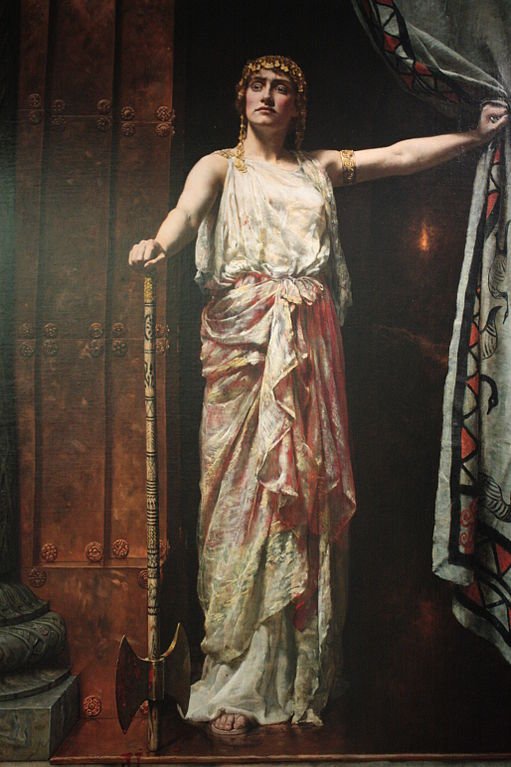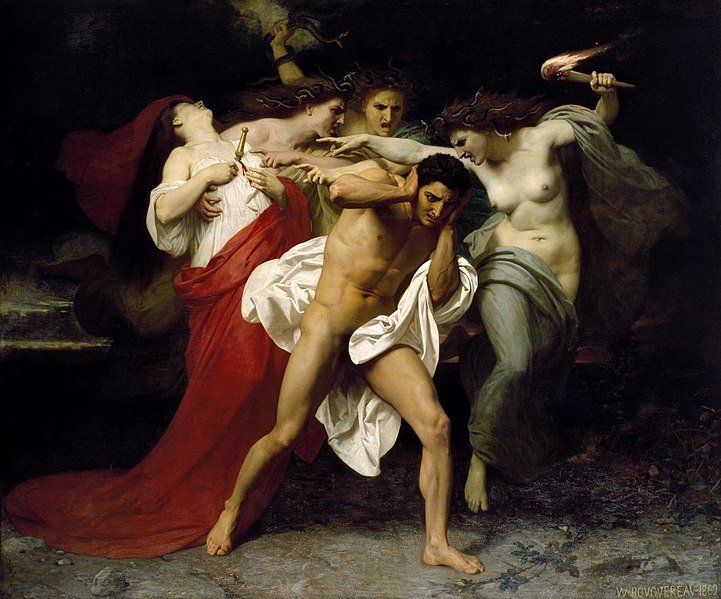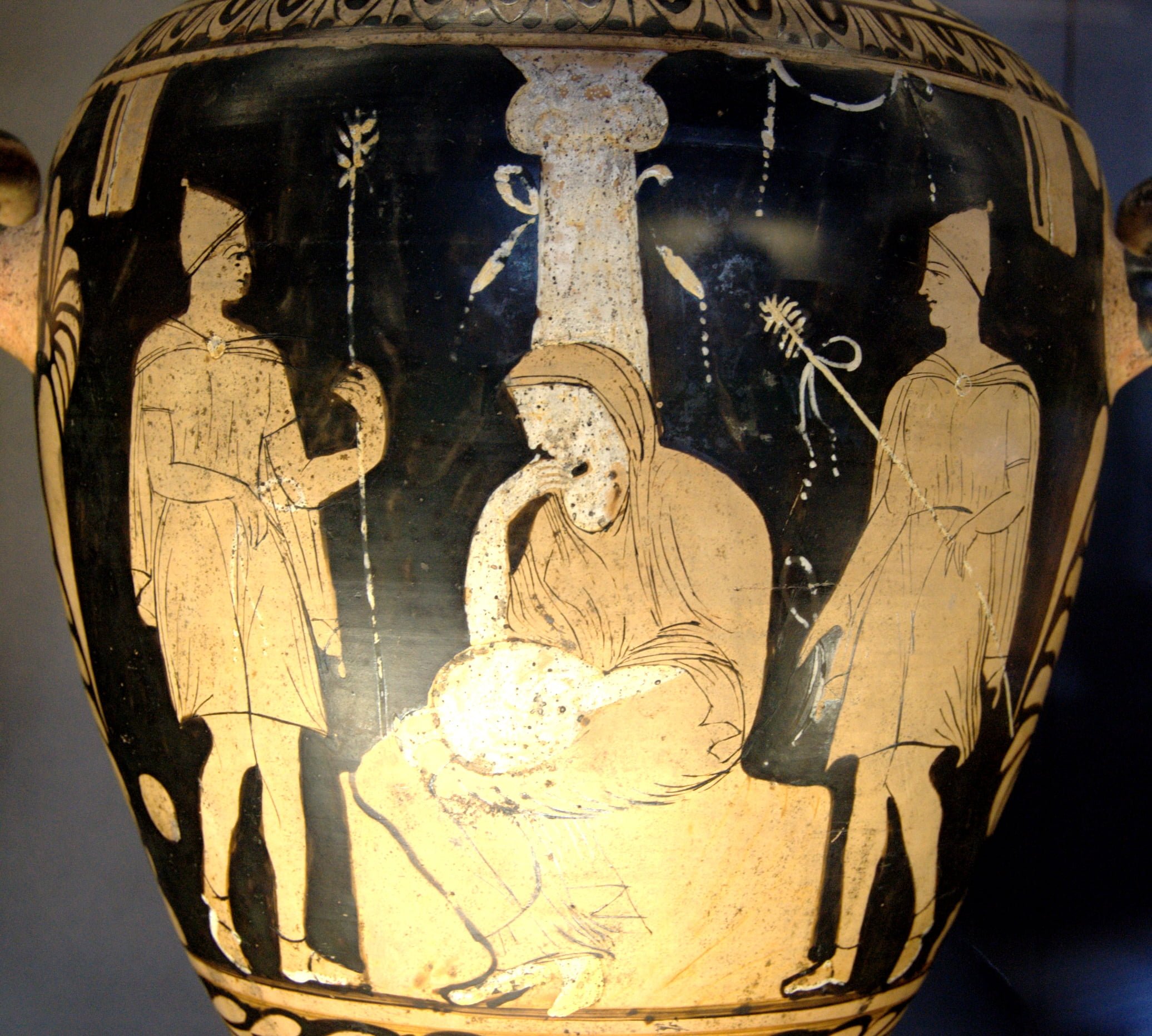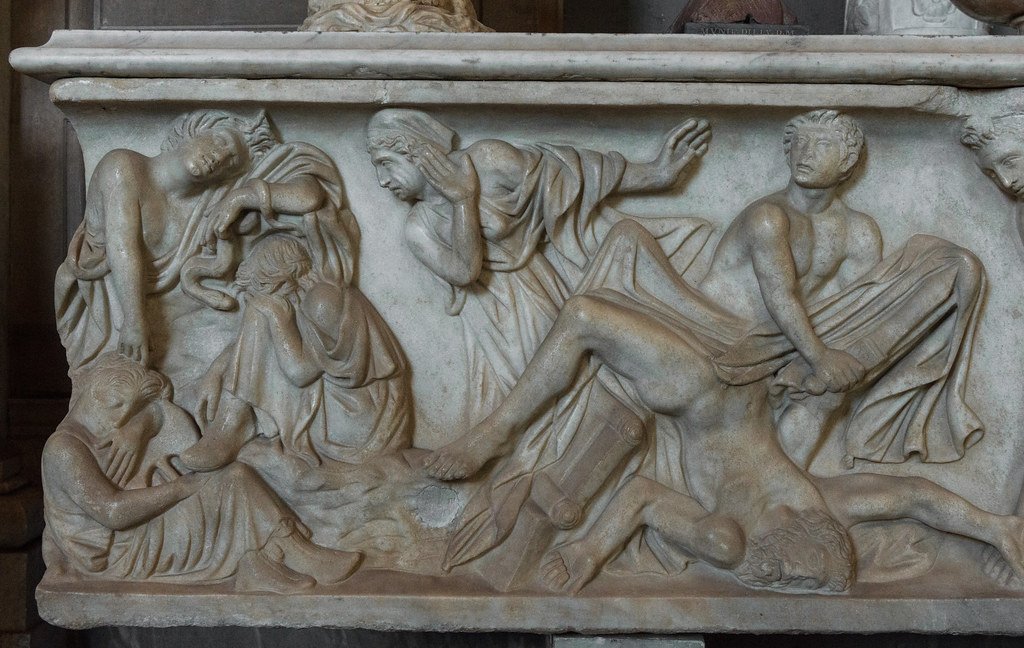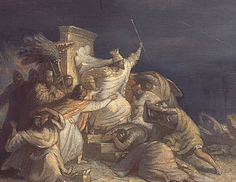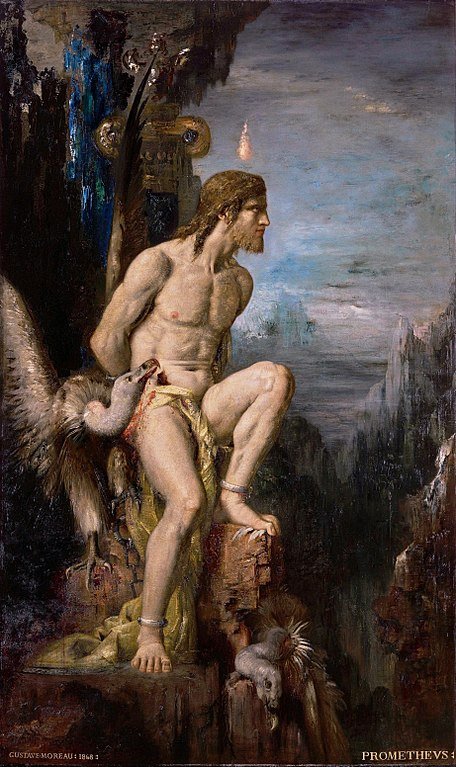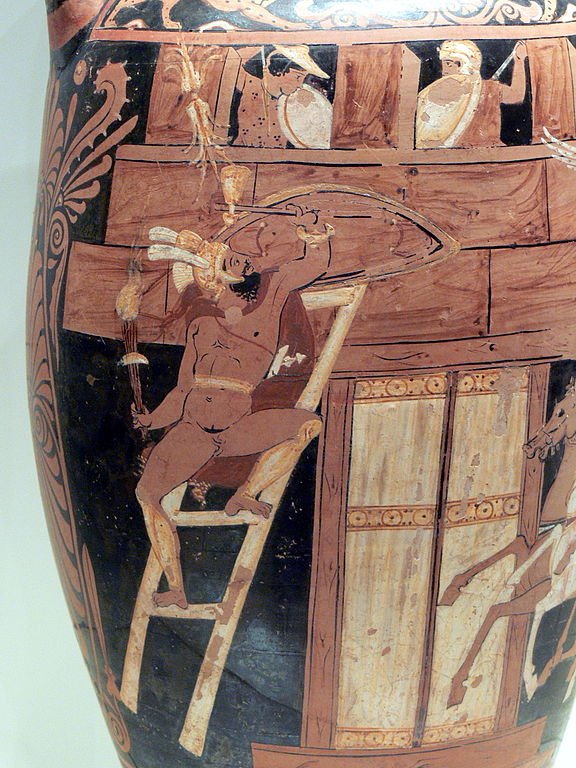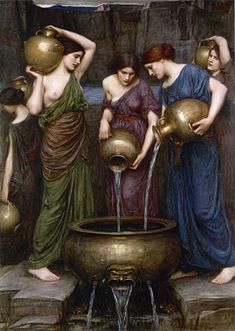Aeschylus
Often described as the father of tragedy by both Ancient Greek authors and modern scholars, Aeschylus is the earliest playwright whose works have survived to this day and age. Born into a well-to-do family at Eleusis in 525/4 BC, he debuted on the stage in the twenty-sixth year of his life, but achieved his first victory only fifteen years later, in 484. However, after this triumph, he was probably victorious almost every time he competed at the City Dionysia until his death, eventually amassing no less than 13 wins, a feat surpassed only by his younger contemporary Sophocles (24). Only seven out of the 70 to 90 plays he is supposed to have written during his life have survived: Persians, Seven Against Thebes, Suppliants, Agamemnon, Libation Bearers, Eumenides, and Prometheus Bound. Agamemnon, Libation Bearers and Eumenides constitute a single story and are part of a trilogy called the Oresteia, which is the only ancient example of this form to have reached us. Oresteia might have been Aeschylus last play because soon after producing it he left (for the second time) to Sicily, where he died in 456/5 BC. Interestingly enough, the inscription on Aeschylus’ gravestone commemorates only his military achievements and makes no mention of his status as the foremost playwright of his day and age.
Aeschylus’ Life and Works
Life
Aeschylus, son of Euphorion, was born into a wealthy and well-established family at Eleusis in western Attica, probably in 525/4 BC.
Since his birth town was the home of the Eleusinian Mysteries, it is not at all surprising that he was, early on, initiated in the mysterious cult of Demeter. In fact, in the Nicomachean Ethics, Aristotle suggests that, later in his life, Aeschylus was accused before the Areopagus of having revealed the secrets of the Eleusinian Mysteries in some of his plays; he was, fortunately, acquitted.
In 490, nine years after debuting as a playwright (499), Aeschylus fought against the Persians in the battle of Marathon, during which his brother Cynegeirus was killed. A decade later, he joined the Greek forces once again and participated in the battles at Salamis and Plataea as well. Naturally, these experiences all found a place in Persians, a historical play, and perhaps Aeschylus’ first great success.
Around 470, after he had already made a name as Athens’ premier playwright, Aeschylus was invited to the court of Hieron, tyrant of Syracuse in Sicily, where many of the leading Greek poets of the day had already temporarily relocated. There, in honor of the new city of Aetna, recently refounded by Hieron (after the old one had been devastated by a volcanic eruption), he produced a play titled The Women of Aetna and restaged Persians.
After his return to Athens, Aeschylus won all but one of the tragic contests until 458, when, following the production of Oresteia, he returned to Sicily. He died there, just outside the city of Gela, in 456 BC.
Ancient sources relate a bizarre (and probably untrue) story about Aeschylus’ death. Supposedly, to avoid a prophecy that he would be killed by a falling object, the playwright spent the last few days of his life outdoors. Unfortunately, one day, an eagle mistook his bald head for a rock and dropped a tortoise on it; Aeschylus died on the spot.
His gravestone, strangely, commemorates nothing more but his military achievements and his participation in the Battle of Marathon; it makes no mention of his theatrical prowess, success, and fame.
Plays
Aeschylus debuted as a tragedian at the City Dionysia of 499, but his first victory came only a decade and a half later, in 484.
Since then, and until the end of his life (456), Aeschylus was probably victorious almost every time he competed (roughly every second year), with the exception of 468 when we know that he was defeated by Sophocles, an event which greatly offended his pride.
The Ancient Greeks seem to have known by title no less than 78 plays written by Aeschylus (different sources attribute him with anywhere between 70 and 90), two of which (Prometheus Bound and Prometheus Unbound) are seriously doubted to have been written by him by modern authorities.
The remaining 76 plays (out of which at least 9 are satyr plays) can be distributed in precisely 19 City Dionysia productions (three tragedies and a satyr play); if we are to believe Aeschylus’ ancient biography, only 6 of these didn’t win Aeschylus the first prize.
Legacy
Even though he was certainly not the first tragic poet – we know that his Persians was modeled after the very successful historical plays of his older contemporary, Phrynichus – Aeschylus is “the first one whose plays we possess and about whom we can say anything definitive.”
Calling him “the father of tragedy” is not an exaggeration: almost everything we know about Greek tragedy before Aeschylus is deduced from Aeschylus’ surviving plays. Even the Ancient Greeks seem to have shared a similar belief. In Aristophanes’ Frogs, for example, the Chorus addresses Aeschylus as he “who first of the Greeks built solemn phrases and decorated tragic nonsense.” Furthermore, in The Life of Apollonius of Tyana, Philostratus the Athenian, a 2nd century Sophist, explicitly states that “the Athenians accounted [Aeschylus] to be the father of tragedy.”
Philostratus offers several justifications for this belief, but the main three reasons may be found already In Aristotle’s Poetics, where the famous philosopher traces the history of tragedy and notes that “it was Aeschylus who first raised the number of the actors from one to two. He also curtailed the chorus and gave the dialogue the leading part.”
If this is true, Aeschylus is the first playwright in history who introduced conflict in his plays: before him, characters must have only interacted with the chorus. More or less, we can observe this evolution in Aeschylus’ surviving plays: the Chorus is much more prominent in Persians and has only a marginal part in the first two plays of Oresteia.
Oresteia is the only Ancient Greek trilogy which has survived to this day. It is a connected trilogy (the tragedies form successive episodes of a single story), and, based on the titles of Aeschylus’ plays, it seems that most of his productions (as many as 13 out of 19) shared this trait.
About three decades after Aeschylus’ death, due to popular demand, the Athenian archons allowed for participants at the City Dionysia to restage Aeschylus’ tragedies rather than compete with their own plays.
A century later – as stated by Plutarch in his Lives of the Ten Orators – Lycurgus of Athens proposed a law according to which the tragedies of Aeschylus, Sophocles, and Euripides, as written by them, should “be copied under the supervision of the community, so that they can be preserved” in the public archives.
This, of course, implies that some of them might have been corrupted during the restagings; there is no way of knowing which and to what extent.
Chronology of Aeschylus’ Life
• 525 – birth at Eleusis
• 499 – Aeschylus’ theatrical debut at the City Dionysia
• 490 – fought against the Persians battle at the battle of Marathon
• 484 – first tragic victory
• 480 – participated in the battle of Salamis
• 479 – participated in the battle of Plataea
• 472 – Victory with an unconnected trilogy (Phineus, Persians, Glaucus; Prometheus)
• 470 – first visit to Sicily
• 468 – loss to Sophocles
• 467 – victory with a Theban tetralogy (Laius, Oedipus, Seven Against Thebes; Sphinx)
• 463 – victory with a connected tetralogy (Suppliants, Egyptians, Daughters of Danaus; Amymone)
• 458 – victory with the Oresteia (Agamemnon, Libation Bearers, Eumenides; Proteus)
• 456 – final visit to Sicily and death at Gela
Aeschylus Sources
You can read, in its original context, Aristotle’s claim that Aeschylus was tried for revealing the secrets of the Eleusinian Mysteries here; for the philosopher’s analysis of Aeschylus’ contribution to tragedy click here. Even though – as correctly described by its translator, Sarah Burges Wilson – “an eclectic mixture of fact, critical assessment, and apocrypha,” the Alexandrian Life of Aeschylus is an indispensable source of information, as is the short biography of the playwright from the relevant entry in the medieval encyclopedia, the Suda. For a longer one with links to relevant sources, consult Gregory Crane’s entry in the Perseus Encyclopedia. Philostratus’ assessment of Aeschylus’ genius and his impact on theater can be found here. Finally, Aeschylus is also a protagonist in Aristophanes’ comedy Frogs, which you can read in its entirety here.
Link/cite Aeschylus page
Written by: The Editors of GreekMythology.com. GreekMythology.com editors write, review and revise subject areas in which they have extensive knowledge based on their working experience or advanced studies.
For MLA style citation use: GreekMythology.com, The Editors of Website. "Aeschylus". GreekMythology.com Website, 17 Jun. 2019, https://www.greekmythology.com/Plays/Aeschylus/aeschylus.html. Accessed 26 April 2024.

